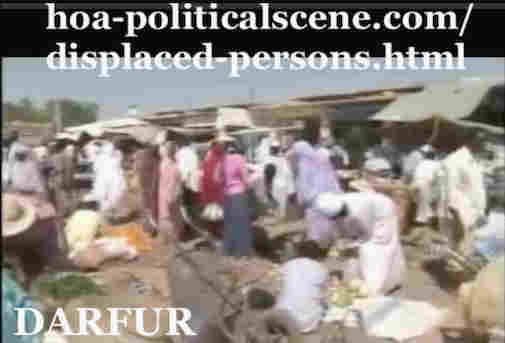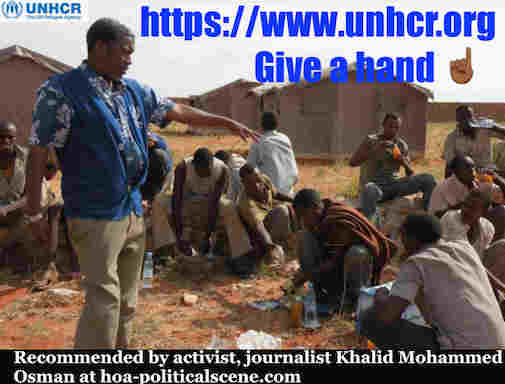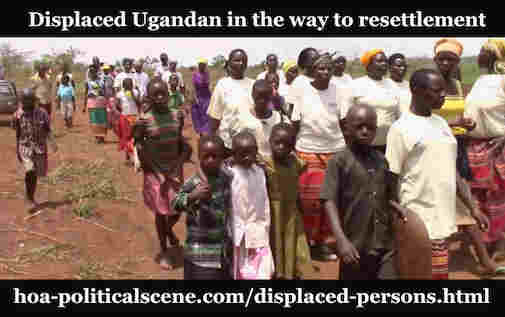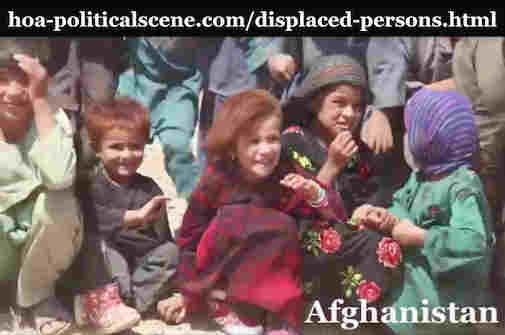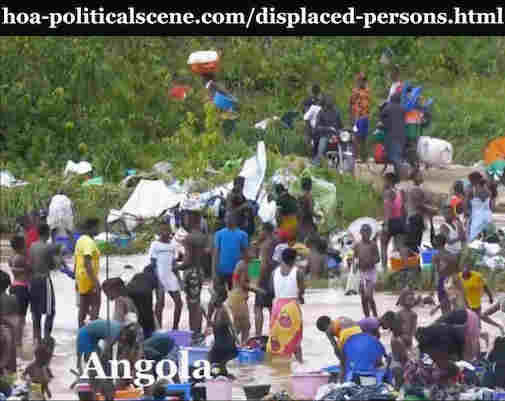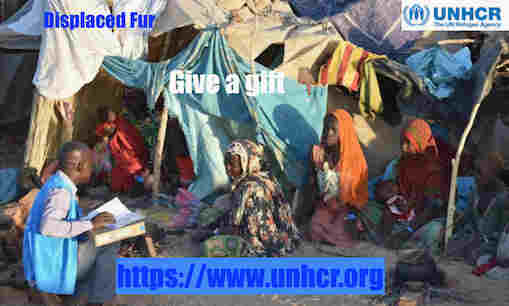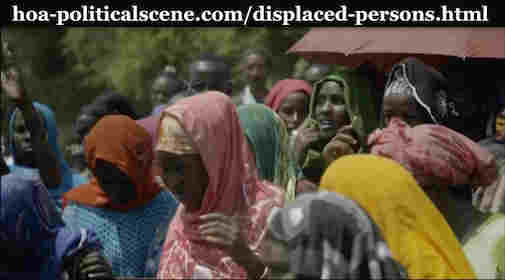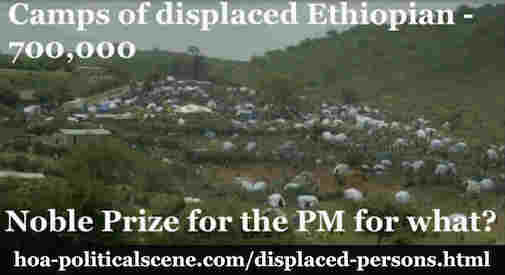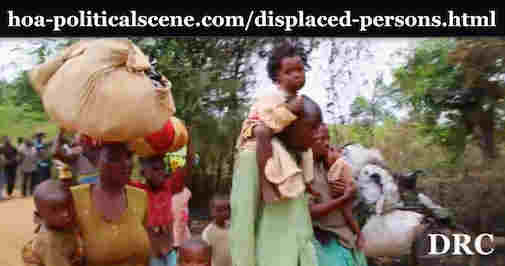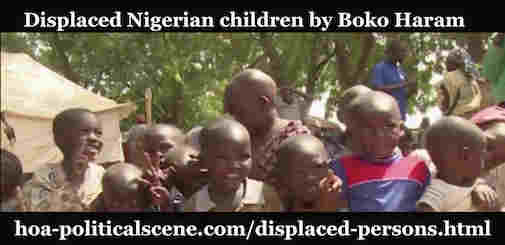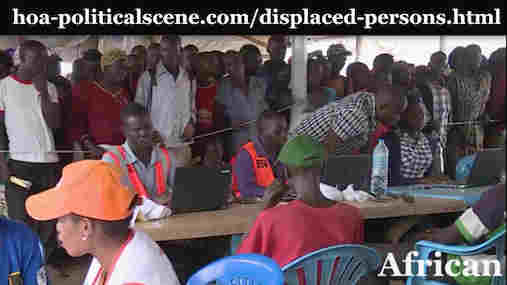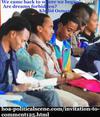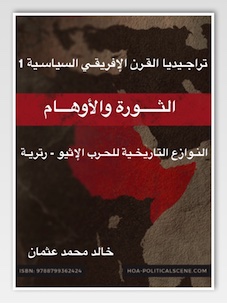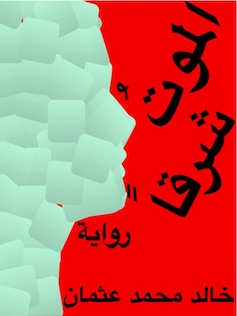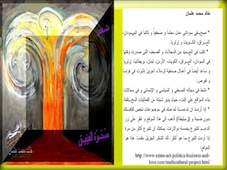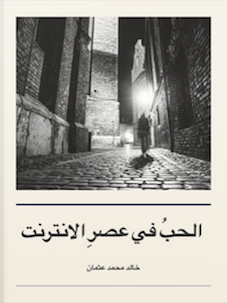Displaced Persons!
The cases of Displaced Persons are the outcome of social circumstances created by interior conflicts, dictatorship, foreign interference, religious political bandits and wars! National people must solve the problem.
Forced Displacement Policies are the Shame of the 21st Century!
 hoa-politicalscene.com/displaced-persons.html - Displaced Persons: are the outcome of social circumstances created by interior conflicts, dictatorship, foreign interference, religious political bandits and wars! National people must solve the problem, says activist, analyst, journalist and poet Khalid Mohammed Osman.
hoa-politicalscene.com/displaced-persons.html - Displaced Persons: are the outcome of social circumstances created by interior conflicts, dictatorship, foreign interference, religious political bandits and wars! National people must solve the problem, says activist, analyst, journalist and poet Khalid Mohammed Osman.The displaced people we see in many countries in Africa, Asia and elsewhere are people who suffer from instability in their societies because of conflicts, dictatorship, wars and sometimes crises of nature.
Unfortunately, the nature is so merciful when it creates crises than humans who play the principle roles in creating political crises in their lands.
The political trends in many countries in the third world is to claim power for long decades and force the people to obey and be silent, or the securities would chase them, rape their children and confiscate their homes to leave them between the earth and the skies, without shelters.
Displaced Person's Report!
This is a report issued by the United Nations General Assembly.
Date: 08 Nov 2006
Urgent attention required to meet needs of Africa's 13 million internally displaced-people, Third Committee told, as discussion of refugee issues concludes World's Total Internally Displaced-Population Estimated at 24 Million.
Urgent national and international attention should be paid to addressing the needs of the 13 million internally displaced people living in Africa, the representative of Zambia said, as the Third Committee (Social, Humanitarian and Cultural) today concluded its general discussion on refugees, returnees and displaced persons. Africa hosted more than half the world's total population of internally displaced persons estimated at 24 million.
She said concerted efforts were needed to support humanitarian assistance in the Darfur region of the Sudan and in neighbouring Chad, where conditions for internally displaced persons and refugees continued to deteriorate.
Eliminating conditions leading to displacement was the best way to open the door for the return of an uprooted population, she said, stressing the importance of peace building and capacity-building efforts.
The United Nations High Commissioner for Refugees (UNHCR), in his report before the Committee, noted that one of the weightiest questions facing the international community was how to tackle the plight of millions of internally displaced persons, whose numbers had increased by 22 per cent from the previous year even as the number of refugees worldwide reached its lowest point in a quarter century.
While refugees still constituted the largest group of people for whom UNHCR was responsible under its mandate, the agency's involvement with internally displaced populations was likely to expand as the international community honed its approach to addressing the needs of internally displaced persons, the report said.
While some delegations expressed support for UNHCR's efforts to assist internally displaced people, others cautioned that the agency should avoid over-reaching. The representative of India stressed that the enhanced focus on internally displaced persons should not result in the neglect of refugees, who were at the core of the agency's mandate and should be the focus of its limited resources. Furthermore, he said, UNHCRs role in situations involving internally displaced persons should be on the basis of explicit requests by the States concerned and should take into account the mandates and expertise of other relevant organizations.
The representative of Colombia emphasized that national authorities had the fundamental responsibility to offer protection and assistance to internally displaced persons within their jurisdiction. The role of UNHCR and other agencies was to help strengthen national capacities and to work in a way that was complementary to and supportive of State actions, she said.
Offering a different view, the representative of the Republic of Korea said the role of UNHCR should be strengthened. Her delegation encouraged UNHCR to protect internally displaced persons working through the "cluster approach", in close cooperation and coordination among various stakeholders. Meanwhile, reform of UNHCR was crucial, she said, in order to help ensure that the agency would have a more mobile, integrated and multi-skilled staff.
The representative of Algeria said that there should not be a weakening of the protection regime of UNHCR, which was faced with a constant increase in the number of vulnerable people falling under its mandate. The precariousness of the agency's resources and the decreasing contributions of donors were a source of concern, as that could lead to gaps in assistance and care given to refugee populations, she said.
Others taking the floor today included the representatives of Iran, the Russian Federation, Angola, Thailand, Azerbaijan, Mauritania, Venezuela, Kuwait, Sudan, Eritrea, Georgia and Ethiopia. The observer of the Holy See also made a statement.
Representatives of the International Organization for Migration, the International Committee of the Red Cross and the International Federation of Red Cross and Red Crescent Societies also spoke.
The representative of the Russian Federation also spoke in exercise of the right of reply, in response to a statement made by the representative of Georgia.
In other business, the Committee heard the introduction of a draft resolution on enlargement of the Executive Committee of the Programme of the United Nations High Commissioner for Refugees and a draft resolution on hostage-taking.
The Committee will reconvene at 10 a.m. on Thursday, 9 November, to begin its general discussion on programme planning. The Committee also was expected to hear the introduction of and take action on a number of draft resolutions.
Background on Displaced People and Statements!
The Third Committee (Social, Cultural and Humanitarian) met today to continue its general discussion on the report of the United Nations High Commissioner for Refugees, questions relating to refugees, returnees and displaced persons and humanitarian questions. For more background, please see Press Release GA/SHC/3868 of 7 November.
The Committee also was expected to hear the introduction of a draft resolution on enlargement of the Executive Committee of the Programme of the United Nations High Commissioner for Refugees (document A/C.3/61/L.47) and a draft on hostage-taking (document A/C.3/61/L.44).
Statements
HOSSEIN LOTFI (Iran) said that his country had generously hosted millions of refugees and displaced persons with limited national resources. Such large numbers of refugees, particularly from Afghanistan and Iraq, had negatively affected the socio-economic situation in Iran. More than 920,000 Afghan refugees still lived in Iran and were in need of adequate international assistance, he said.
They should not be forgotten. Following the significant political changes in Afghanistan, Iran had worked with the Office of the United Nations High Commissioner for Refugees (UNHCR) on a joint programme for the voluntary repatriation of Afghan refugees. Since the start of the programme in April 2002, more than 1.46 million Afghan refugees had returned, marking an unprecedented voluntary repatriation operation in the history of UNHCR activities.
However, the pace of returns had slowed and increased international assistance was needed to make returns sustainable and to provide food, shelter, education and welfare services for the returnees. Unemployment and poverty also presented obstacles to return. Iran was firmly committed to the voluntary repatriation of refugees and was continuing to work with the Government of Afghanistan and UNHCR to find sustainable and comprehensive solutions.
His delegation believed that UNHCR should focus on its mandate on refugees and not be diverted by attention to internally displaced persons.
Many Iraqi refugees also had expressed enthusiasm for return, he said, with about 100,000 of 200,000 going back after the political changes there. However, because of security reasons or the lack of reintegration facilities, enthusiasm for return had dampened.
Iraqi refugees should be assisted to return home under well-managed voluntary repatriation arrangements and provided with necessary facilities upon their return for smooth reintegration in Iraq.
CHO SU-JIN (Republic of Korea) said it was encouraging to see that refugee numbers were at their lowest level since 1980.
A significant number in Africa, the Middle East, Asia and Europe were still waiting to return home, however, and the international community had a shared responsibility to provide protection to refugees and internally displaced persons.
Given the lack of effective asylum procedures, finding durable solutions and physical protection for asylum seekers in countries of first asylum was of utmost urgency.
UNHCR’s role as a protection agency should be strengthened, she said. South Korea wanted to encourage UNHCR to protect internally displaced persons with a cluster approach, with close cooperation and coordination among stakeholders.
Reform of UNHCR was crucial; once completed, UNHCR would have a more mobile, integrated and multi-skilled staff. Host countries should consider the potentially harsh punishments that might await someone forcibly repatriated.
An effective system for monitoring returnees was needed; one that monitored both methods of deportation and the conditions and safety upon return would help ensure against refoulement.
Russian Displaced Persons!
BORIS V. CHERNENKO (Russian Federation) said his country had continued to uphold its international obligations regarding the protection of refugees and strengthening of cooperation with UNHCR and other humanitarian organizations.
It was pleased to hear that there had been a reduction in the overall number of refugees, and the international community had to undertake great efforts to ensure that that trend continued. The humanitarian component would remain for the foreseeable situation, given global developments.
A joint and integrated search was needed in order to find responses to new challenges to humanitarian activities; Russia believed in multilateral cooperation with the United Nations playing a key role.
Humanitarian organizations should make a contribution to countering international terrorism, and strictly observe principles of international law, he said.
A significant number of migrants from developing countries to economically developed countries in the West had been economic migrants not needing international protection. To exclude all those who could not claim international protection, a meticulous approach was needed.
The High Commissioner's reform initiative was justified; at the same time, there needed to be strict conformity to UNHCR’s mandate.
UNHCR's work on the regional level was a very valuable element in that regard, and it was important to continue the post-Conference process on refugees in the Commonwealth of Independent States, applying in practice the unique experience acquired at the Geneva forum that ended in 2005.
The principle of voluntary contributions to UNHCR was important. The ultimate aim of UNHCR's transformation and planned reforms should be increased effectiveness and the ability to respond to challenges which arose.
NOTE from the website administrator: This might have been the same Russian ambassador to Kuwait during the eighties Boris Chernenko.
Angolan Displaced Persons!
ISMAEL ABRAÃO GASPAR MARTINS (Angola) said his Government recognized its primary responsibility to assist and protect refugees and internally displaced persons.
It recently had made available resources to support the final phase of the repatriation process in accordance with its commitment to the tripartite agreement between Angola, Zambia and UNHCR. His Government had prioritized the areas of mine action, food safety and professional training.
Landmines posed the main obstacle to recovery and reconstruction, and to the rehabilitation of refugees, he said. The Government had established in 2005 an executive de-mining commission that had made substantial progress in sensitization initiatives and removal of explosive devices.
He also expressed concern over the growing occurrence of natural calamities, which affected food security. The Government had launched a sustainable rehabilitation programme aimed at ensuring food self-sufficiency and provided food assistance to those most vulnerable.
Only countries that had suffered the total destruction of their economic fabric could appreciate the challenge of reintegrating more than one third of the population into the national economy, he said.
Angola hoped that a programme for demobilized soldiers would establish safer conditions in the rural areas and would encourage internally displaced persons to resume productive lives in the rural economy, freeing additional national resources for investment.
He appealed to donors to assist in the conclusion of the repatriation process and support the socio-economic reintegration of refugees, internally displaced persons and demobilized soldiers.
Thai Displaced Persons!
KHUNYING LAXANACHANTORN LAOHAPHAN (Thailand) said the fact that the number of refugees had declined did not mean that the number of people being forced from their homes for fear of persecution had diminished; indeed, the number of internally displaced persons was looming large across the world.
Globalization had meanwhile increased the challenge of the migration-asylum nexus, which required a comprehensive and coherent response. Thailand welcomed the 10-point plan of action to address mixed migratory movement, introduced by UNHCR, but that plan should be implemented in a balanced manner, with legitimate concerns of host countries and the principle of international burden-sharing informing its implementation.
Thailand had long been at the receiving end of successive waves of population influx –- waves that had not been without impact on its limited resources and its society, she said. But it was glad not to have been alone, and it was determined to strengthen its partnership with UNHCR.
Recently, Thailand had taken steps to improve the living conditions of over 100,000 displaced persons from Myanmar along its western border, such as improved education, access to employment, more effective national status determination and integration of HIV/AIDS sufferers into the national healthcare system.
The international community should do more to help developing countries that hosted refugees and displaced persons; voluntary repatriation was the preferred option, but in a protracted situation, resettlement -– a test of international burden and responsibility-sharing -- was the next best option.
Colombian Displaced Persons!
CLAUDIA BLUM (Colombia) noted the efforts made by her Government to protect the rights of internally displaced persons, which had been recognized by the UNHCR Office in Colombia.
Implementation of the Justice and Peace Law and the creation of a National Reparation and Reconciliation Commission had helped to guarantee the participation of the victims of displacement in the judicial process.
The law provided for reparations, including the return of illegally seized assets. Furthermore, the Government's democratic security policy and the demobilization of more than 42,000 people previously belonging to violent groups, which had caused forced displacement, contributed to protecting the life, liberty and assets of Colombians.
She stressed that, in accordance with various United Nations resolutions, national authorities had the fundamental responsibility to offer protection and assistance to the internally displaced within their jurisdiction.
The role of United Nations agencies, including UNHCR, was essential in providing support and assistance to national capacities, without affecting the responsibilities, obligations and sovereign decisions of States. There was a need for the work of the UNHCR to be complementary and supportive of State actions, she said.
Zambian Displaced Persons!
PATRICIA CHANDA CHISANGA KONDOLO (Zambia) said that while refugee numbers in Africa had kept up with world trends, the internally displaced persons population in 2005 stood at an unacceptable 13 million, or more than half the world total.
Urgent national and international attention was needed. In circumstances where a State was confronted with large numbers of refugees on its territory, where means of livelihood were highly competitive or inadequate, repatriation was the preferred durable solution.
In that regard, Zambia recognized the swiftness with which UNHCR had facilitated the implementation of the Angolan Repatriation programme in 2003, which the Government of Angola had agreed to extend by another year to 2006.
Eliminating conditions leading to displacement was the best way to open the door for the return of an uprooted population to its country of origin, she said. Peace building and capacity-building efforts had to be emphasized in order to facilitate voluntary repatriation.
Where fundamental political changes had occurred in a country of origin, but did not result in significant returns, UNHCR had to act decisively.
Despite its desire to see refugees return voluntarily, Zambia recognized that in some cases, they might not be able to do so, due to a low absorption capacity; the international community should expedite capacity-building programmes to effectively support returns.
Concerted efforts were needed to support urgent humanitarian situations in Africa, especially in the Darfur region and neighbouring Chad where the internally displaced persons and refugee situation had continued to deteriorate. Urgent action was needed on the peace building front, as well as in meeting the needs of internally displaced persons and refugees.
Algerian Displaced Persons!
SALIMA ABDELHAQ (Algeria) said that there should not be a weakening of the protection regime of UNHCR, which was faced with a constant increase in the number of vulnerable people falling under its mandate.
The precariousness of the agency's resources and the decreasing contributions of donors were a source of concern, as that could lead to gaps in assistance and care given to refugee populations. Resources should be allocated on the basis of need and should allow the UNHCR to provide a tailored and flexible approach to situations.
Algeria was a host country for refugees from countries ranging from Viet Nam to Chile, she said. It hosted many refugees from the Sahel, a land of deserts and fratricidal combat, as well as thousands of Palestinian refugees.
The Sahrawi people had found refuge in Algeria while awaiting a solution in their homeland, which should involve self-determination. Algeria also had provided assistance to countries suffering from drought and floods and helped with relief operations.
Her delegation failed to understand the reduced assistance provided by UNHCR and the World Food Programme to the Sahrawi people, despite their growing needs. It was a matter of urgency to review that situation and avoid exposing Sahrawi refugees to further danger, she said.
Azeri Displaced Persons!
FARAH ADJALOVA (Azerbaijan) said United Nations agencies still needed to strengthen cooperation and revitalize collaborative action regarding internally displaced persons in order to address existing gaps in international response.
Azerbaijan supported the newly employed cluster approach. She expressed appreciation to UNHCR and to the High Commissioner for his visit in August to review the agency's involvement in her country.
Hundreds of thousands of internally displaced Azerbaijanis that had been forcibly evicted from their native lands had been reassured, at least for a moment, that they had not been forgotten by the United Nations Refugee Agency and that their hardship and perseverance were still on the international community's radar.
She said that she welcomed the agency’s renewed commitment to finding solutions for displaced persons, particularly the right to return to their native lands, as well as its willingness to assist Azerbaijan in planning for a future big return of forcibly displaced populations.
Her country continued efforts to improve the living standards of its displaced population through temporary integration initiatives.
Measures were being employed to eliminate refugee and internally displaced persons camps and to move the displaced families, currently residing in those camps or other places that were unsuitable for living, into newly-built temporary village settlements with the necessary infrastructure, education and health care facilities.
UNHCR's technical and consultative assistance to capacity-building in Azerbaijan in strengthening the asylum system was crucial.
Mauritanian Displaced Persons!
DJIBRIL MAME LY (Mauritania) expressed appreciation for the role that UNHCR had played, together with others, in his country's development.
Mauritania in August 2005 had entered a new era of its political history, opening the way to establishing a democratic and pluralistic system based on guarantees of equality and justice for all.
As part of this patriotic process, many Mauritanians living outside the country had decided, by themselves, to return and to freely play the roles that fell upon them in the work of nation-building.
No Mauritanian faced any obstacle in obtaining nationality and, therefore, there was no reason today why a Mauritanian should be a refugee outside the country, he said.
At any moment, Mauritanians could return without difficulty or constraint. They would be able to enjoy all their rights, guaranteed by whole process of reform. That reality on the ground was known by all observers and partners, including UNHCR.
Due account should be taken of this fact, and it should be properly recorded.
Indian Displaced Persons!
MUFTI MOHAMED SAYEED (India) said that the recent drop in annual voluntary repatriation figures needed to be addressed. Protection must remain at the core of UNHCR's work.
New challenges arising from internal displacement should receive greater attention, but an enhanced focus on internally displaced persons should not result in the neglect of refugees, which had the first charge on the Agency's mandate and its limited resources.
Further, UNHCR's role in situations involving internally displaced persons should be on the basis of explicit requests by the States concerned and should also take into account the complementarities of mandates and the expertise of other relevant organizations.
He said that further discussion and elaboration was required in the area of UNHCR's role pertaining to mixed migratory flows. It was essential to develop capacities to differentiate refugees from economic migrants so as to better address their protection needs.
The search for durable solutions to various refugee situations must be intensified. Voluntary repatriation was preferable. The "4Rs" approach of repatriation, reintegration, rehabilitation and reconstruction should be extended to other programmes.
The protection of refugees must be seen in the larger socio-economic context and in light of some of the basic causes that were responsible for generating mass displacement, particularly extreme poverty and lack of adequate resources for economic and social development.
The 1951 Convention and 1967 Protocol were the cornerstone of the international refugee protection regime, but they had been adopted in the specific context of conditions in post-World War II Europe. They did not cover a number of issues of significance today, particularly the phenomenon of massive refugee flows and mixed migration.
Venezuelan Displaced Persons!
JACQUELINE PETERSEN (Venezuela) said Venezuela’s 2001 Organic Law on Refugees and Exiles established the right of people to seek refuge in Venezuela under the 1967 Protocol of the Statute of Refugees; prohibited the forced return of and discrimination against refugees; guaranteed refugee family unity; and guaranteed special protection for child refugees, particularly those separated from their immediate families.
In 2004, Venezuela had created the National Refugee Commission and decentralized, regional technical offices in the border states of Tachira, Zulia and Apure. A mass influx of Colombians fleeing armed conflict in their country had entered Venezuela.
UNHCR's refugee assistance programmes were important for such people in need of protection. Social programmes created by the Chavez administration had been extended to refugees and asylum seekers in Venezuela in order to integrate them into society without discrimination.
Such programmes, she continued, existed in areas such as literacy, primary and secondary education, higher education, health care, job training, indigenous peoples' rights, food and housing. UNHCR's mandate was to guarantee protection for refugees.
Mixed migratory movements of immigrants was a separate matter from refugee protection. States from which refugees were fleeing were primarily responsible for addressing the root causes of such flight through political will and concrete action.
States were also responsible for addressing the plight of internally displaced persons, whose status was different than that of refugees, exiles or migrants.
Kuwaiti Displaced Persons!
Mr. AL-SHEHAB (Kuwait) said his delegation was satisfied with the achievements over recent years that had resulted in the number of refugees worldwide reaching its lowest level in 25 years.
However, he noted that the report of the High Commissioner for Refugees had raised many questions regarding the international protection of refugees, the challenges facing his office and the challenges posed by immigration flows.
He also highlighted the importance of addressing the particular needs of vulnerable groups, including women and children.
He appealed to the international community to provide necessary assistance and facilities to safeguard the lives of the 21 million refugees worldwide who had the right to a life of dignity.
Kuwait had provided $750,000 in voluntary contributions to UNHCR and supported its activities. His country provided assistance to Palestinian refugees and recently had provided relief and humanitarian support for Lebanese refugees whose houses were destroyed by Israeli aggression.
Kuwait also provided assistance to refugees and displaced persons in Afghanistan and Pakistan.
Sudanese Displaced Persons!
Mr. TAHA (Sudan) said his country was ready to strengthen cooperation with UNHCR. The Sudan had been at the forefront of countries which had received refugees.
Since independence, it had assumed a burden of refugees without discrimination, with goodwill, and despite the fact that the Sudan had been suffering the fallout of crises in its neighbourhood.
The interruption of protection and assistance to refugees in the Sudan, and the renunciation of the international community to shoulder its responsibilities, had led to a burden that the Sudan had tried to fulfil on the basis of its values and international commitments.
The signing of the peace accords in Darfur provided a solid foundation and had allowed the start of a process of return for Sudanese refugees from neighbouring countries, as well as the return of internally displaced persons within the country, to their villages, he said.
There they could carry on a dignified life with every opportunity in housing, food, employment and rehabilitation. The Sudan had been carrying out effective cooperation with UNHCR and other agencies, sharing the burden as the "helping stage" made way to a "reconstruction stage".
Eritrean Displaced Persons!
AMANUEL GIORGIO (Eritrea) said the issue of refugees was of particular concern to his country, which had suffered from years of conflict.
Thousands of people had fled to the Sudan and elsewhere during the conflict; however, many had been repatriated after his country’s independence. Often, those repatriated had found inadequate support for their reintegration and were in need of food, shelter and employment.
UNHCR, meanwhile, was hampered by a lack of resources. International financial contributions often fell short and did not match stated commitments to burden-sharing.
The root causes triggering refugee outflows also needed to be addressed, he said. There also was a need for greater cooperation between United Nations agencies dealing with peace and security and those dealing with humanitarian issues. All United Nations bodies must make serious efforts to resolve conflict.
His delegation was concerned that the needs of internally displaced persons were not adequately covered in the past, he said. The development of an inter-agency standing committee to address the gaps was an important step towards addressing that problem.
Georgian Displaced Persons!
TAMAR TCHITANAVA (Georgia) said that issues related to refugees and internally displaced persons were particularly acute for Georgia, due to the conflicts in its two breakaway regions of Abkhazia and Tskhinvali Region/South Ossetia.
Ethnic cleansing and genocide were conducted against Georgians, but also other nationalities that had been forced to flee those regions.
Due to the lack of a political settlement 15 years after the end of hostilities, those people were still denied the right to return and were forced to live in crowded temporary shelters or other similar accommodations.
The United Nations, and particularly UNHCR, had been involved in negotiations to secure prompt and safe return of refugees and internally displaced persons to their homes, but unfortunately those efforts had been negatively interpreted by the separatists and the process of organized return had been stalled.
The spontaneous return of the Georgian internally displaced persons had taken place predominantly in the Gali district, where the human rights situation was extremely precarious. Most of the grave violations of basic human rights happened in the zone of responsibility of the Russian peacekeepers, which were doing virtually nothing to prevent or confront them.
She said that, to legitimize their regime and to change the demographic situation, the separatists had proceeded on discriminatory actions like forcing the returnees to acquire "citizenship" or taking conscripts to the "Abkhaz Army". It was inadmissible that houses and other property of the Georgians had been sold to new owners.
Another problem, which should be qualified as cultural genocide, was the issue of banning instruction in the Georgian language in Gali schools, where the entire school curriculum was taught in the non-native Russian language.
Georgia was taking all measures to improve conditions for the refugees and internally displaced persons and to facilitate their integration into the local societies. At present, work on property restitution and asylum assistance legislation was under way.
Ethiopian Displaced Persons!
LULIT ZEWDIE G/MARIAM (Ethiopia) said the plight of millions of internally displaced persons called for urgent cooperation from the international community. Currently, in Ethiopia, there were more than 100,000 refugees in seven camps.
The majority -– about 70,804 –- were South Sudanese. Following the peace agreement signed in January 2005, many had been preparing to go home, while others had been repatriated in line with a tripartite agreement between UNHCR and the Governments of Ethiopia and the Sudan.
There were also about 16,123 Somali refugees -– the residue of a massive influx in the 1980s and 1990s -– and about 111,503 Eritrean refugees. Some 555 urban refugees from 13 different countries were in Addis Ababa.
Many African countries, including Ethiopia, had continued to host a large number of refugees, sharing with them their meagre resources, she said. The cost had been environmental degradation, deforestation, depletion of water sources, soil erosion and destruction of infrastructure.
The magnitude of the problem showed how much support Africa needed in addressing the problem of refugees, and a reminder to Africans of the need to address the root causes of conflict.
The under-funding of field operations had made the lives of refugees more difficult in some African countries, including Ethiopia; the international community was called upon to generously respond to calls for funding that could directly benefit refugees.
Archbishop CELESTINO MIGLIORE, Permanent Observer of the Holy See, noted that the legal system had adapted to evolving demands, as could be seen by the adoption of the Conclusion on Women and Girls at Risk and the Conclusion on Identification, Prevention and Reduction of Statelessness and Protection of Stateless Persons.
Another positive development was the internally displaced persons through the cluster approach. The reality on the ground required greater attention to their needs, without losing sight of the special characteristics of refugees and their protection.
In addition to a good legal framework, protection required cooperation and political will, he said. Unfortunately, the legal concept of asylum appeared to be eroding as some States gave preference to national legislation or bilateral agreements over international refugee law.
Access to asylum also had become more difficult, partly because of the phenomenon of mixed flows, with some countries not upholding internationally established rights such as freedom of movement and the right to work. Furthermore, he noted that programmes remained largely under-funded, resulting in reduced food rations and inadequate provision of health, education and community services.
LUCA DALL’OGLIO, of the International Organization for Migration (IOM), said the IOM and UNHCR were collaborating closely to strengthen cooperation on global migration and development.
The two organizations were working together to address humanitarian crises due to large-scale mixed population movements. Such emergencies required policy and operational coordination. A working group was addressing emergencies in the West Mediterranean.
The IOM, UNHCR and the Italian Red Cross had collaborated to successfully provide relief and protection to thousands on the Mediterranean island of Lampedusa. That approach could be extended to other similar situations.
In so-called mixed-migratory flows, UNHCR’s role was to guarantee asylum seekers access to proper status determination procedures and appropriate responses, while IOM's role was to ensure that effective migration management legislation and implementation practices were consistent with relevant international provisions.
UNHCR was leading the Camp Coordination and Camp Management Cluster for internally displaced persons whose situations resulted from conflict, and IOM was charged with assisting people displaced by natural disasters, he continued.
UNHCR and IOM had adopted a unified approach to avoid overlap and increase effectiveness. They had set up a cluster working group and training programmes to expand and improve camp management and staff readily deployable at the onset of an emergency.
Along with the Norwegian Refugee Council, UNHCR and IOM had created a Camp Management Toolkit and conducted joint "training of trainers" seminars in Ethiopia and the Philippines.
DOMINIQUE BUFF, of the International Committee of the Red Cross (ICRC), said that unlike refugees, internally displaced persons had not been the subject of a specific international convention.
If they were in a State experiencing armed conflict, however, they were protected by international humanitarian law, which expressly prohibited any party to an armed conflict from compelling civilians to leave their homes, although temporary evacuations could be carried out.
Action was required to ensure compliance with the law; the ICRC, as the custodian of international humanitarian law, would keep reminding all those concerned of their responsibilities. Humanitarian endeavours only complemented political action, and all States party to the Geneva Conventions of 1949 had a responsibility to ensure respect for international humanitarian law.
Internally displaced persons could be very vulnerable not only during their displacement, but also upon their return, he said. Primary responsibility for protecting them, and to responding to their needs, lay unequivocally with the State or other authorities under whose control they found themselves.
Increased awareness of internally displaced persons should not lead to neglect of those who had not left their homes, as they sometimes faced ever greater threats.
The scope and magnitude of the needs of internally displaced persons surpassed the capacity of any single agency; the ICRC had closely followed the United Nations humanitarian reform process, including efforts to develop a "cluster" approach, and it enjoyed a close relationship with UNHCR. To preserve its unique character and capacity to act independently, the ICRC intended neither to take the lead of a cluster nor to be a cluster member.
MICHAEL SCHULZ, of the International Federation of Red Cross and Red Crescent Societies (IFRC), expressing gratitude to the High Commissioner for highlighting the importance of strengthening the respect for international protection principles, said that capacity-building at the national and local levels was a powerful tool in saving lives and providing protection in emergencies.
Referring to the importance of Governments' ensuring that dialogue channels remained open with humanitarian actors, he said that vulnerable groups would often rather seek the support of a local Red Cross, than approach the authorities.
On the issue of insufficient resources devoted to status determination, he welcomed UNHCR's efforts to increase its assistance to a number of countries.
Furthermore, the Mediterranean region had highlighted the common problem of people in a state of extreme vulnerability -- those without documents, but with a well-founded fear of persecution.
He, therefore, underscored the need for States to maintain procedures allowing persons to have their asylum claims processed in a normal, humane and culturally-sensitive fashion.
Statement in Right of Reply!
Speaking in exercise of the right of reply, the representative of the Russian Federation said that the statement made by the representative of Georgia did not help civilized relations between the two countries, which was what was needed at this time.
He recalled the position stated by the Russian Federation's Minister of Foreign Affairs during a meeting with Georgian officials, in which he stressed the need to end hostile rhetoric and provocations and to fulfil all Security Council resolutions and agreements reached in the efforts to settle the Abkhaz and South Ossetia conflicts.
Introduction of Draft Resolutions
The representative of Estonia, on behalf of Costa Rica and Estonia, introduced a draft resolution on the enlargement of the Executive Committee of the Programme of the United Nations High Commissioner for Refugees (document A/C.3/61/L.47).
He explained that the resolution aimed at increasing the number of members of the Executive Committee of the Programme of the United Nations High Commissioner for Refugees from 70 to 72.
Costa Rica and Estonia had applied for membership in the Executive Committee, guided by their interest in and devotion to resolving refugee problems. They shared the goals of the Programme of the UNHCR, and believed that the agency had a crucial role in improving the lot of refugees and internally displaced persons the world over.
As an emerging donor to UNHCR and a member of the European Union, Estonia was determined to participate in international humanitarian cooperation; it had supported UNHCR through voluntary contributions and in response to emergency appeals, he said.
Membership in the Executive Committee would provide an opportunity for Estonia to enhance its contribution to resolving refugee and displaced person problems around the world. It was an honour for Estonia to present the resolution with Costa Rica, which had had a long tradition of receiving and hosting refugees.
Introducing a draft resolution on hostage-taking (document A/C.3/61/L.44), the representative of the Russian Federation said that the issue was no less urgent now than when the General Assembly had last considered it in 2002.
The Russian Federation was deeply familiar with the issue, he said, recalling the barbaric and monstrous crimes committed in September 2004 in Beslan, where children and their parents were taken hostage and shot in the back in cold blood. He also noted the tragic events earlier this year, when hostages were taken from the Russian embassy in Baghdad and killed.
The victims of such terrorist acts were innocent people, yet the criminals tried to justify their actions on the basis of concern for violations of human rights, he said. His delegation was convinced that by adopting the proposed resolution, the General Assembly would send terrorists a clear signal condemning hostage-taking and confirm the inadmissibility of using rhetoric about human rights protection to justify such practices.
Displaced Persons and Other Humanitarian Issues!
In addition to Displaced persons, you may also be interested in the following humanitarian articles in the HOA Humanitarian Network, which is one component of Khalid Mohammed Osman's Journalism Network:
A Goodbye Kiss| Art of Prime Ministering| Awassa| Awassa Children's Village| Child Abuse| Child Care| Child Labor| Child Love| Children Refugees| Child Safety| Child Soldiers| Child Trafficking| Children Trafficking| Dogmatism| Environment| Environment Protection| Green Peace| Jyllands Postens Cartoons| Liberalism| Street Children|
Like the Displaced Persons Report?
Share displaced persons with your socials and the other services you see on the small buttons on the page, or pin one of the HOA Calls Pictures at HOA's Gallery, HOA's Photo Gallery and HOA's Sacred Scripture. Thanks.
You can watch documentaries on DISPLACED PERSONS at TVCinemaApp.com.
Use the following comments form to write about displaced persons if you know about any, or to write comments on DISPLACED PEOPLE.
Have A Great Story About This Topic?
Do you have a great story about this? Share it!
What Other Visitors Have Said
Click below to see contributions from other visitors to this page...
No Refoulement Should Be Issued to Repatriate Eritrean Refugees from Denmark! Not rated yet
The Eritrean refugees who came to Denmark either through the UNHCR, or those who came voluntary, or smuggled to Denmark from other countries are all eligible …
Comment C2 Entries on DISPLACED PERSONS appear on the section of the humanitarian page just below the comments form and above this paragraph. Please, when you read commentaries, interact and let's know what you think. Thanks.
African Political Refugees| African Refugees' Influx to Europe| African Refugees' Influx to Europe - Comments| Alarming Secret Deportation of 12 Eritreans| Alarming Secret Deportation of 12 Eritreans - Comments| Asylum Seekers in Libya Under Great Fear| Blind world around the European frontiers| Blind world around the European frontiers - Comments| DAFI| Drama Rules Some Eritreans| Eastern Sudan Feeds Israel by Human Power| Eri-Ethio Mixed Families| Eri-Ethio Mixed Families - Comments| Eritrea and Libya: The Same Fate for Eritrean Refugees| Eritrea and Libya: The Same Fate for Eritrean Refugees - Comments| Eritrean Exodus| Eritrean Exodus - Comments| Eritrean Refugees| Eritrean Refugees in Ethiopia| Eritrean Refugees in Ethiopia - Comments| Eritrean Refugees Situation is Late to Attract Attention| Eritrean Refugees Situation is Late to Attract Attention - Comments| Ethiopian - Eritrean Refugees are Disappointed| Ethiopian - Eritrean Refugees are Disappointed - Comments| Ethiopian Refugees| EU Plays Hide and Seek Politics with Refugees in Libya| EU Plays Hide and Seek Politics with Refugees in Libya - Comments| 15 Eritreans Are in Danger of Deportation from Libya| HOAs Refugees| HOAs Refugees Project| Humanitarian Network| Human Rights in Kakamega, Kenya| Human Rights in Kakamega, Kenya - Comments|
Did you get any of my books from Apple Books?
Click here to tell me & get some free books. Fill the form.
رواية "الموتُ شرقاً" تكشف لك سرّ الموت الشرقي التراجيدي المستمر للإنسان
احصل علي الرواية الآن واكتشف إنهيار القواسم المشتركة، واستلهم إبداعا يشبه الأسطورة في النص الروائي
"Follow", "like", "tweet", or "pin" the pictures to express your love! Thanks
TweetHorn Africa's Political Tragedy
Love in the Internet Time on Apple Books
Rising of the Phoenix Poetry on Apple Books
Free Poetry Picture Book
Free poetry picture book on Apple Books. You can use the images on public places for your customers to enjoy, while taking coffee.
The French & Spanish Versions
You can work the French versions and the Spanish versions of the two books above with me on, one on one bases. Contact Us.
HOAs Political Poetry Imaged
I'll be thankful, if you get one of my books.
My Books!
Publish Your BookLet's be the publishers of your book. Use the form at Contact Us.

